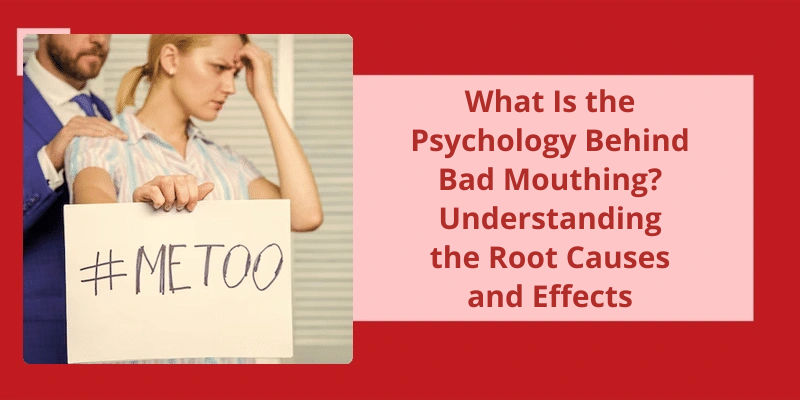However, there are deeper psychological elements at play when it comes to the act of bad-mouthing others. It’s a complex behavior that involves both the individual doing the bad-mouthing and the target of their words. Understanding the psychology behind bad-mouthing can offer insights into why people engage in this behavior, what drives them to do so, and how it affects those around them. By exploring these elements, we can gain a more nuanced understanding of this often-destructive behavior and work towards creating more positive and supportive social interactions.
What Does It Mean to Use Word Bad Mouthing in Your Conversation?
When we use the word “bad mouthing” in a conversation, we’re essentially implying that someone is speaking negatively about another person or something. This action may be intentional or unintentional, depending on the speakers intention behind the words they choose to use.
Moreover, bad mouthing can lead to long-lasting consequences, including tarnishing reputations, damaging close relationships, and ruining opportunities for growth and development. When we resort to bad mouthing, we’re essentially devaluing the achievements, skills, and hard work of others, while simultaneously disregarding our own accountability for our own shortcomings. This is why it’s important to practice mindfulness and self-awareness when it comes to our speech and how it impacts others around us.
Ultimately, using negative language and engaging in bad mouthing can lead to a spiraling chain of events, where multiple parties may end up feeling hurt, misunderstood, and belittled. Instead of resorting to such behavior, it’s imperative to practice empathy, kindness, and constructive communication in all interactions, especially during difficult or contentious situations. By doing so, we can create a more harmonious and healthy environment, where everyone is respected, valued, and given the opportunity to grow and succeed.
-A Discussion on the Psychology Behind Why People Engage in Bad Mouthing Behavior
This is a discourse about the human psychology that motivates one to engage in negative communication about others, known as bad mouthing.
While badmouthing can seem like an easy way to gain social power, it also carries certain risks. In contrast, engaging in prosocial behavior may be a more reliable route to social success with fewer negative consequences. Let’s explore this further.
Why Do People Like to Badmouth Others?
It’s a common behavior among human beings to badmouth others, often in an attempt to feel superior or gain social power. People can engage in this behavior for a multitude of reasons, from wanting to elevate themselves to a certain social status or feeling threatened by someone elses success. This behavior is especially common in groups, where individuals try to outdo each other and gain power over their peers.
By putting someone else down, they may feel a temporary boost in their self-esteem, which makes them feel better about themselves. This may lead to a cycle of badmouthing others as a way of coping with their own insecurities. While this behavior may provide temporary relief, it isn’t a healthy long-term solution.
However, engaging in prosocial behavior, such as being kind or helping others, can also lead to social success. By being compassionate and empathetic towards others, individuals can gain the respect and admiration of their peers and build strong social connections. This kind of behavior not only promotes a healthy social environment but it also creates a more positive outlook on life and fosters a sense of community.
While it may appear to bring temporary social power and confidence, it comes with significant risks and no long-term advantages. By refraining from badmouthing and promoting positive interactions, individuals can create more meaningful and genuine relationships that will last a lifetime.
Psychological and Sociological Factors That Contribute to the Behavior of Badmouthing Others.
This topic explores the psychological and sociological reasons that lead individuals to engage in badmouthing others. It looks into the various factors that may influence these actions, such as personal insecurities, social norms, and the desire for control or dominance.
Source: Why do people badmouth me all the time?..
Now that we’ve explored different synonyms for “bad-mouthing,” let’s delve into a crucial aspect of communication in the workplace: maintaining professional decorum. In a fast-paced, high-pressure environment, it can be tempting to vent frustrations about colleagues or projects. However, it’s important to express these feelings in a constructive manner that doesn’t damage relationships or undermine others’ work. So, how do you communicate criticism or negative feedback in a professional way? Let’s find out.
How Do You Say Bad Mouthing Professionally?
Talking ill of others in a professional setting can be a tricky situation. There are times when it’s necessary to provide negative feedback about someones work or behavior, but doing it in a way that doesn’t come across as bad-mouthing can be challenging. One approach is to focus on the behavior or actions that need improvement, rather than criticizing the person themselves. Using language that’s respectful and objective can also help keep the conversation professional.
Synonyms for bad-mouthing include dismiss, minimize, criticize, diminish, disparage, denigrate, and belittle. These words all have negative connotations and can be damaging to relationships and professional reputations. Instead of using these kinds of words, it can be better to use language that’s constructive and solution-focused. This can help to keep the conversation positive and focused on improvement rather than criticism.
One way to professionally give feedback that may be perceived as negative is to frame it in terms of how the behavior affects the team or organization. For example, rather than saying “Youre not pulling your weight on this project,” you could say, “It’s important that we all contribute equally to this project so that we can meet our deadline and achieve our goals.”. This approach helps keep the conversation focused on the desired outcomes rather than the perceived shortcomings of the person.
Another strategy is to use “I” statements when giving feedback. This means framing the feedback in terms of how you’re feeling or perceiving the situation, rather than what the person is doing wrong. For example, instead of saying “Youre not meeting your deadlines,” you could say “Im feeling frustrated because Im not getting the information I need on time.”. This approach can help to depersonalize the feedback and shift the focus to problem-solving rather than blame.
When giving feedback that may be perceived as negative, it’s important to do so in a private and respectful manner. This helps to maintain the persons dignity and prevent them from feeling attacked or embarrassed in front of others. It’s also important to be specific about the behavior or issue that needs improvement, rather than making generalizations or assumptions. This can help the person understand what they need to work on and come up with a plan to improve.
How to Handle Bad-Mouthing in the Workplace From Colleagues or Superiors
- Don’t engage in negative behavior or bad-mouthing back.
- Assess the situation carefully and determine the source of the problem.
- Find a trusted coworker, mentor, or Human Resources representative you can confidentially discuss the situation with for guidance.
- Stick to the facts when presenting your concerns or grievances.
- Be calm and professional in your communication with the colleague or superior.
- Document any incidents of bad-mouthing or inappropriate behavior for future reference if needed.
- Focus on positive relationships and building allies within the workplace.
- Consider seeking professional counseling or therapy if the situation becomes too stressful or emotionally draining.
Conclusion
By promoting empathy, understanding, and cooperation, we can work together to build communities that are based on mutual respect and positivity rather than fear and intimidation. Only through such efforts can we hope to create a brighter, more harmonious future for us all.






